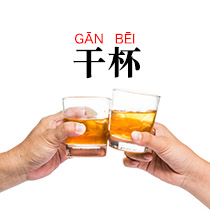You've successfully copied this link.
Chinese drinking culture: 4 tips for success

Did you know? Drinking is serious business in China. In fact, the Chinese drinking culture in China is such an essential part of cultivating “guanxi” and forging successful business deals that it’s practically considered as part of the job.
Since centuries ago, many important business transactions were accomplished around a banquet table amongst endless cups of alcohol.
Today, possessing an impressive (or at least decent) drinking capacity is considered an “asset” or “skill set” for certain employers – many whom believe that a willingness to drink equates to impressing the client, thus improving their business prospect and taking them one step closer to sealing the deal.
This is because Chinese believe that by powering through multiple rounds of Baijiu (白酒) – China’s fiery vodka-like liquor that translates to “white liquor” – or other spirits, they’re giving face to the host or their guest, as well as nurturing and saving face for themselves, their bosses, or their company.
Usually, this happens over the course of countless rounds of toasting and yelling the phrase, “GÄn BÄ“i” (å¹²æ¯), which literally means “drain your glass dry”. (Think of it as the Chinese version of “Cheers” or “Salut”, except they really mean “Bottoms up” instead.)
Perfecting the art of toasting, Chinese style
As in many aspects of Chinese culture, there is an unspoken ritual or order to the Chinese art of toasting. Firstly, it’s key to understand that rank matters when toasting. Are you the host or the guest? How high do you rank in terms of office hierarchy?
Here are some tips to adhere by when drinking with Chinese clients.
TIP 1: Who and when to toast
Basically, who you toast – as well as and when to toast – all depends upon your status. Usually, the host will kick things off with the first toast, which is normally dedicated towards the VIP guest(s) of the night.
Unless you’re the host, never make the first toast.
That’s a massive faux pas whereby some Chinese will consider it a form of disrespect to the host since you have stolen the limelight from him/her.
Once the first toast is done and out of the way, you may then leave your seat to toast others.
Unsurprisingly, gravitating towards the highest-ranking guest to raise a glass is the norm before you should work the room to toast others, usually table by table.
By the time the dinner or banquet comes close to an end, you’d probably have gotten the hang of toasting. Assuming you’re still somewhat sober, you’ll know the night is over when you see the host giving a last toast to thank guests for attending.
TIP 2: To clink, or not to clink
The general rule of thumb in China is that clinking glasses equates to “GÄn BÄ“i” where you have to bottoms up.
No clinking? Feel free to just sip or drink however much you want.
In the event when others would like to clink glass with you, here’s a trick you can attempt in order to avoid the imminent bottoms up – hold your glass in a way so the back of your fingers will touch the other person’s glass instead.
This is a “Suí Yì” (éšæ„) signal – which means, “as one pleases” or “at one’s discretion” – and indicates that you’d rather take it slow and just sip.
TIP 3: How high do you clink?
Things get trickier, though, if your boss or superior or someone of higher rank approaches you to offer a toast.
In times like this, remember to clink the rim of your glass lower than theirs as a show of respect.
The VIP or more senior person is supposed to clink at a higher position than others, but they’ll usually lower their glass too to match everyone else as a sign of humbleness.
TIP 4: Follow suit
Sometimes, if a superior offers a toast you can watch them drink first. If they down it, then follow them and drink ‘em all. To sum it up, let’s put it as a “monkey see, monkey do” situation.
Proving your worth with drinking courage
Interestingly enough, many Chinese also use it to gauge your “liquor courage” or “JiÇ” DÇŽn” (酒胆). In other words, it can be a subtle measure of whether you’re a real man with guts.
That’s why you may see many who are “weak in body but strong in spirit” – Chinese who may have drank to the point of oblivion, but will doggedly continue to drink in order to uphold their dignity and Miàn Zi.
Do note, though, that such drinking culture is usually reserved for men, as women are usually let off the hook and not expected to drink. Nevertheless, if a woman does choose to join in, she’ll usually end up scoring double points for having such “JiÇ” DÇŽn” (酒胆).
Talking the talk
While many deals are sealed over drinks, it won’t do to dive headlong into the nitty gritty business details when networking with the people you meet at Chinese dinners and banquets.
Instead, keep things light and general. Want to hash out the intricate and finer details? Save it for another time in the office or set up a tentative appointment to meet on a later date.
Remember, the goal is to deepen your bond with the people (read: potential clients) around you and cultivate guanxi, not bore them to tears or alienate them by being pushy and insistent of talking shop during a banquet.
But how are you to clinch the deal if you can’t talk about business? It doesn’t take an Einstein to figure out how it works. Would you prefer to do business with a stranger or with a familiar face?
Catch our drift now? In short, the better your relationship is with your Chinese client, the smoother your path to success would be. As Sherlock Holmes would say, “Elementary, my dear Watson."
Drink up, agents
Now that you know what offering a drink may mean for your guanxi, don’t forget to put the above into practice if you ever find yourself out at lunch or dinner with your Chinese buyer.
Smile, go with the flow, and if you dare… make your toast with a hearty “GÄn BÄ“i” (å¹²æ¯)!
Liked this article? Sign up for free to get Juwai Juwai Asia Market updates!
2024 © Juwai. All Rights Reserved Privacy Policy | Terms of Service


